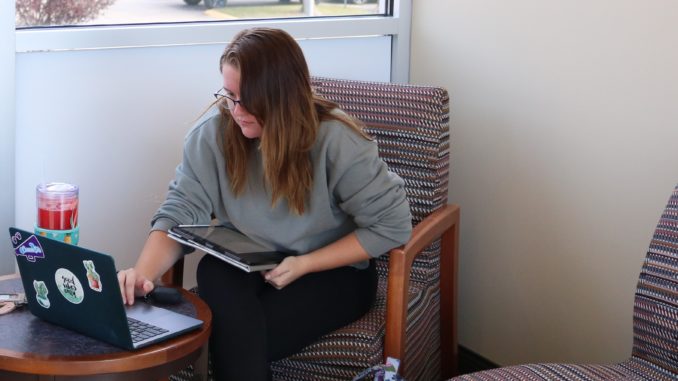
Truman State University has added new academic programs for the 2022-2023 academic year.
In the School of Health Sciences and Education, a master’s degree in disability studies and a graduate certificate in applied behavior analysis are now options for students.
Chris Rosado, Ph.D., applied behavior analysis program director, said these programs have been added to help prepare individuals to be a Board Certified Behavior Analyst. The main difference between the two programs is that one of them is a certificate for those who already have a master’s degree.
Rosado said this field is similar to counseling and social work. Individuals are trained to work with people who have disabilities such as autism. The disabilities studies portion of the program focuses on teaching students to advocate for those with disabilities, while the behavioral component teaches students how to become clinicians. For instance, their career work might include working with a child with autism to help them communicate.
Rosado said the job market for these programs is relatively strong. Demand for jobs in certification in this field has gone up by 35%, while actual growth has been only 22%, so there are many open opportunities for graduating students.
Rosado said this program was developed to meet the needs of rural Missouri areas. The program is online, so anyone from across the state can join the program. It is also designed to allow people to maintain their jobs full-time while going through the program.
There are ten content-level courses for the master’s program. It is set up for two courses to be taken per term, with one taken during the summer. Throughout an eight-week term, there would be only two meetings per class. There is also an internship included within the program. The applied behavioral analysis certificate differs by having eight courses and no internship.
“The good thing about our internships is people can do them at the places they work at, so they get paid at the same time,” Rosado said. “So if they’re working at a special education class that is cool — maybe they work for an APA clinic, a behavioral analysis clinic — they could do it there.”
In addition, a bachelor’s degree in applied linguistics has been added this year. The University already has a program in theoretical linguistics. Mary Shapiro, Ph.D.,, a professor of linguistics, said there was large demand among students for this new program.
There were students who were less interested in the theoretical aspects of linguistics and more interested in the social applications, such as how some languages and dialects are discriminated against in the fight for social justice, Shapiro said. She also said many students want to teach English as a second language and adding this degree provides students with another avenue to pursue that goal.
Shapiro said many of the courses that come with this degree are already being taught at the University. Courses in subjects such as sociolinguistics and teaching English as a second language were pulled together to form this new major, with not many having to be added.
Shapiro said applied linguistics has a wide range of potential fields, such as teaching English abroad. There are also jobs in fields such as branding and marketing, where linguists can help ensure their strategies are effective. In addition, many companies and organizations need translators and language policy workers.
Shapiro said there are new classes added for all linguistic majors at the University. There is a new major seminar where all linguistic majors share a one-credit course to learn the differences between applied and theoretical linguistics. In addition, there is a one credit mid-major seminar and a one credit senior seminar. These are shared between the three linguistic majors to maintain a unified campus community.
Darrin Hetrick, Ph.D., is a new professor at Truman this year, and was brought in for the new applied linguistics major. He said one of the biggest uses for the degree is learning how to teach English as a second language, so it’s at the intersection of linguistics, education and culture. Other common uses include language policy development and translating.
Hetrick said linguistics is about understanding how people learn languages, why they learn them and how language impacts wider socio-cultural elements of society. He said language sometimes holds hidden connotations that may impact those we interact with.
“We need to understand our language carries a lot of underlying messages that we don’t always recognize or understand,” Hetrick said. “That’s really an important aspect of applied linguistics that I hope students understand.”
A bachelor’s degree in music business is another new program this year. Eric Dickson, Ph.D., music department chairperson, said a similar degree existed in the 1980s until it was discontinued. He said this program is largely a reaction to the current music business, which is very entrepreneurial in nature, so this degree is meant to help prepare students for this environment.
Dickson said this program includes many of the traditional music classes but also pulls in business classes. Dickson said one of the most important major courses is Introduction to the music industry. It is a course that students take in their second semester of the major where they learn how to market themselves, do taxes and learn more about the music business.
Dickson said one of the final courses of the major is a capstone internship. Students in the major will begin preparing for this during their intro to music industry class by showing students paths available to them.
“I hope that students will see this as an opportunity to understand how vast the music industry is,” Dickinson said. “You can teach, you can perform, you can be in administration, you can run a recording arts studio. I hope they gain an understanding of how big the industry is and how many different possibilities there are to be successful in the music industry.”
